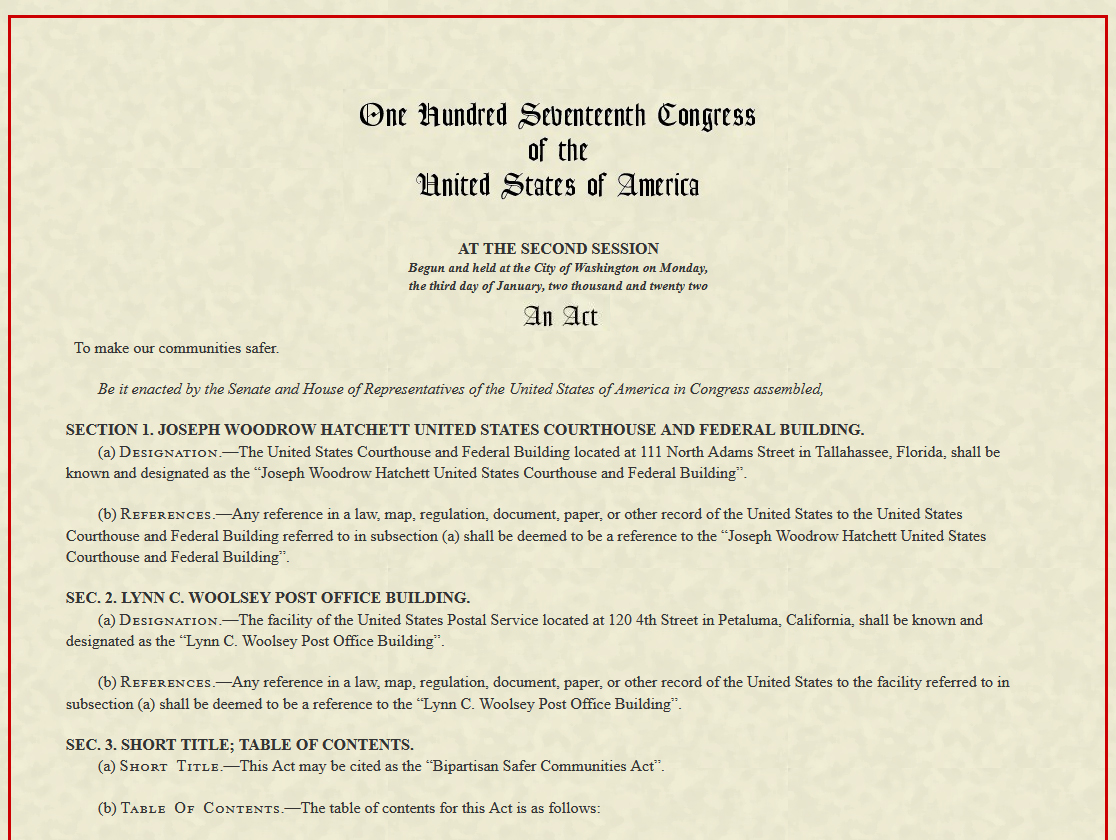Opinion: S. 2938 – THE BIPARTISAN SAFER COMMUNITIES ACT
S.2938 has passed both the House and the Senate and has been signed into law by former Vice President Joe Biden as of 6/25/2022 and has become Public Law No: 117-159.
The Executive Summary of the bill states “The bill expands the existing Medicaid Certified Community Behavioral Health Clinic demonstration program nationwide for behavioral health services. It also includes supplemental funding related to school-based mental health and safety, including mental health services, and funding for primary care training, the mental health block grant, and suicide prevention programs.
The bill provides $750 million in funding over five years to states to support “crisis intervention services,” including the enactment of red flag laws. It clarifies criteria for prohibiting firearms purchases for crimes committed by juveniles. It establishes the first federal criminal offenses and penalties for “straw purchasers” – people who purchase guns on behalf of others, usually those who would be banned from purchasing a firearm such as violent criminals, drug dealers, and terrorists.
So what does this bill include as it pertains to firearms.
- Requires background checks for firearms purchasers under 21 to include checks to determine if the person has a juvenile record that would prohibit them from purchasing a firearm.
- Expands the time for the FBI to investigate cases of possible disqualification for purchasers under 21 from three to 10 business days. If the investigation has not concluded within 10 days, the transfer would go forward.
- Requires people who repeatedly buy and sell firearms “to predominantly earn a profit” to register as “federal firearm licensees.”
- Allows states to use Byrne JAG grant funds to implement “crisis intervention” programs. These can include mental health courts, drug courts, and “extreme risk protection order programs,” commonly known as red flag laws. Section 12003 requires state extreme risk protection order programs meet certain pre- and post- deprivation due process rights and standards.
- Establishes the first ever federal criminal offenses and penalties for “straw purchasers” – people who purchase guns on behalf of others, usually those who would be banned from purchasing a firearm, such as violent criminals, drug dealers, and terrorists. Straw purchasers can receive up to 15 years imprisonment, and up to 25 years when straw-purchased weapons are used in the commission of a serious crime.
- Prohibits firearm transfers to drug cartels to avoid another “Fast and Furious” debacle.
- Provides FFL’s with access to NICS to run background checks on prospective employees, to ensure they are not prohibited from possessing firearms.
- Defines “dating relationship” for purposes of clarifying which people may be prohibited from possessing a firearm under current law based on a domestic violence conviction as “a relationship between individuals who have or have recently had a continuing serious relationship of a romantic or intimate nature.” This provision is not retroactive.
- Grants people convicted of misdemeanor domestic violence automatic restoration of their right to possess a firearm after five years have passed from the end of their criminal sentence, providing they have committed no further crimes of violence.”
While this bill provides for numerous other provisions pertaining to the Department of Health and Human Services and the Department of Education all crammed into one bill under the guise of “public safety” the firearms related provisions of this bill seem laughable given that a number of the provisions are already laws, or at least myself and everyone else I know in the firearms industry have been under the impression that some of these laws already exist, but nevertheless the verbiage is in the bill and the bill has thus been signed into law.
- Item 1 basically says that juvenile records will now be considered when persons under the age of 21 try to purchase a firearm from an FFL. While this may seem pretty commonsense, firearms enthusiasts everywhere already know that any expanded regulation from the government only opens the doors for biased interpretations of the law or egregious infringements on a citizen’s rights. Its the whole “give them and inch and they’ll take a mile” aspect of governance that makes everyday citizens skeptical due to the government’s tendency to violate the very laws they are sworn to uphold.
- Item 2 simply expands the 3 day grace period for “delayed” transfers for persons under 21 years of age from 3 business days to 10 business days. As it stands right now if a person acquiring a firearm from an FFL gets delayed during the NICS background check process the FBI then has 3 days to conduct and finalize their background check process and to provide that decision to the transferring FFL. If a decision has not been made, or the FBI has not notified the transferring FFL, in that 3 day period then the transfer will be completed and the person acquiring the firearm can then take possession of said firearm. This new provision only effects people under the age of 21, so for anyone over the age of 21 nothing changes in regard to this provision.
- Item 3 requires that anyone who buys and sells firearms “to predominantly earn a profit” to register as an FFL. This provision is a little confusing in that this activity is something that is already regulated by the government, or at least that is what I have always been lead to believe. Currently a private citizen can sell their personal property, which includes firearms, to another private citizen with no involvement from the government, which I believe this practice is protected by a commerce clause of some sort but I need to further research this information. So while a private citizen can sell their personally owned firearms, even for a profit, they cannot make a regular practice of procuring and selling firearms. If laws regarding this already exist, then why is it in this bill?
- Item 4 appears to grant funding to the states for the implementation of “Red Flag Laws”. It doesn’t necessarily say this explicitly, but that’s how I read it.
- Item 5 is another confusing provision. It “establishes the first ever federal criminal offenses and penalties for “straw purchasers””. Are there not already laws on the books that prohibit a person from acquiring a firearm for a prohibited possessor? I am pretty sure that those laws already exist, but given the verbiage in the bill it would lead you to believe that “straw purchases” are not currently regulated by the federal government.
- Item 6, another joke, Prohibits firearms transfers to drug cartels to avoid another “fast and furious” debacle. This has to be a joke. Who provided the firearms to the drug cartels during operation Fast and Furious? I’m pretty sure it was the federal government under Obama. I’m also pretty sure that selling guns to drug cartels, terrorists and whatnot is already punishable under penalty of law. But again, the fact that this verbiage is in this bill makes me question things that I have always believed to be common knowledge in the firearms community.
- Item 7 enables an FFL to conduct NICS background checks on perspective employees to determine their legal status as it pertains to being in the presence of firearms. This doesn’t seem like that big of a deal and background checks are probably something that some FFL’s already practice during their hiring processes. Even without access to conduct a NICS background check on another person, currently anyone can go online and conduct a background check on another person using any one of the multitude of services that provide background checks for a fee. This provision seems to enable an FFL access to conduct a NICS background check in the absence of a firearms transfer.
- Item 8 appears to define who can own and / or possess a firearm as it pertains to the relationship status of citizens, particularly to citizens with criminal backgrounds that would prohibit that individual from legally owning or possessing a firearm. Again, pretty sure these provisions already exist in some form or another, but I guess I could be wrong. My understanding has always been that if you live in a household with a prohibited possessor then there cannot be firearms stored on the premises, or something to that effect. But once again, the fact that this verbiage is included in this bill creates confusion regarding laws that are already thought to have been in effect.
- Item 9 automatically restores the rights of individuals convicted of misdemeanor domestic violence crimes after a 5 year period of good behavior. While I am all for the restoration of a citizen’s rights, I have to question why this provision solely focuses on domestic violence when domestic violence is a surefire way to lose your right to bear arms. I interpret this as a form of entrapment where the government feigns it’s appreciation for the rights of the individual by restoring the rights of peoples convicted of domestic violence crimes in hopes that the individual will eventually become a repeat offender and commit a crime violent enough to permanently revoke that individuals right to bear arms. Imagine if that were the case, how does a provision like this serve to create “Safer Communities”?
With that last question in mind here is something else included in this bill that I found particularly interesting given that the bill is titled “Bipartisan SAFER COMMUNITIES Act”. In the section Title III – OTHER MATTERS it apparently prohibits federal K-12 funding from being used for providing anyone with, or training anyone to use, a dangerous weapon. If interpreted correctly then this “safer communities” bill hinders educational institutions from using federal funding for providing weapons training to any of their employees. I guess armed and capable law abiding citizens must not be considered an aspect of “safer communities”, but that’s none of my business.
In conclusion; it is my opinion that this bill is not actually intended to create safer communities as it seems to neglect any focus on actual pertinent issues that lead to gun violence. Seemingly the federal government always falls short when it comes to practical solutions to deter gun violence, but they never falter when it comes to further restricting ones right to bear arms and the God given right of self defense.
Hopefully you find this information interesting and we would love to hear your thoughts in the comments section.
To clarify: I am in no way a legal expert and none of the opinions conveyed in this post are meant to be interpreted as literal. I am only providing information as I have interpreted it and I encourage you to research this information for yourself and draw your own conclusions.
Sources:
Comments are closed.



